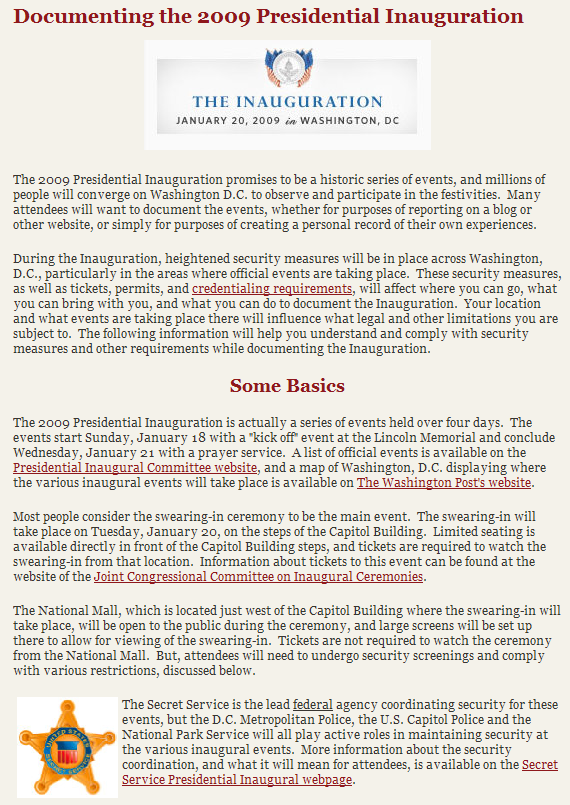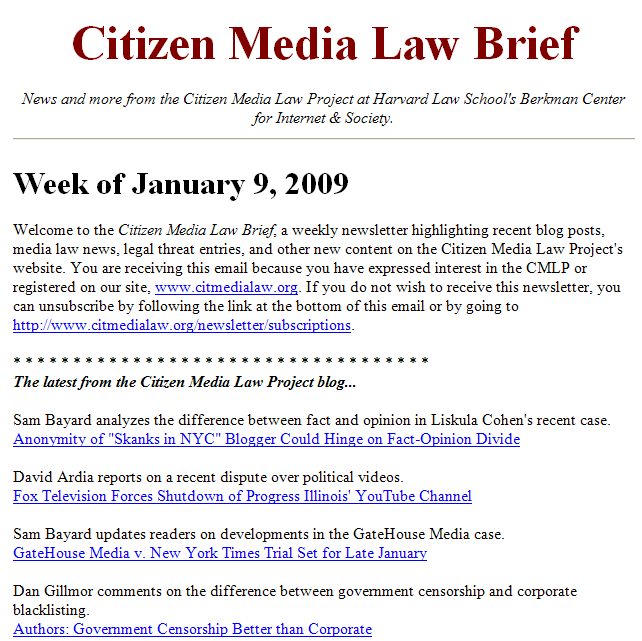Today, we are launching the final sections of the Citizen Media Law Project's online guide to media law covering the risks associated with publishing online, including defamation and privacy law. (You can read the press release here.) The free online guide, which is intended for use by bloggers, website operators, and other citizen media creators, focuses on the legal issues that non-traditional and traditional journalists are likely to encounter as they gather information and publish their work online.
The legal guide, which runs
more than 575 pages, is funded by the John S. and James L. Knight Foundation. It covers the 15 most
populous U.S. states and the District of Columbia and is broken into six major
sections:
- Forming
a Business and Getting Online,
which covers the practical issues online publishers should consider in
deciding how to carry on their publishing activities, including forming a
for-profit and nonprofit business entity, choosing an online platform, and
dealing with critical legal issues relating to the mechanics of online
publishing;
- Dealing
with Online Legal Risks,
which covers managing a website and reducing legal risks through
compliance with the Digital Millennium Copyright Act and other laws, finding
insurance, finding legal help, and responding to legal threats;
- Newsgathering
and Privacy,
which addresses the legal and practical issues citizen media creators may
encounter as they gather documents, take photographs or video, and collect
other information, including information on state shield laws and using
confidential sources;
- Access
to Government Information,
which provides information for citizens to proactively use the law in an
affirmative manner to enhance their reporting and highlights the extensive
amount of information available through government sources and explains
how both traditional and non-traditional journalists can use various
public access laws, including the Freedom of Information Act, state open
records and open meetings laws to gather and make effective use of
government information;
- Intellectual
Property,
which explains various intellectual property concepts, including
copyright, trademark, and trade secrets, and provides practical advice to
online publishers about how to use the intellectual property of others and
protect their own property from exploitation; and
- Risks
Associated with Publication,
which covers defamation law, privacy law, rights of publicity, and other
legal risks that can arise from public distribution of content. This section also explains the legal
risks associated with the publication of reader comments and other
user-submitted material.
Of course, law is never static, so we'll be updating the guide from time to time. If you would like to stay abreast of these changes and any new material, please sign up for our weekly newsletter, the Citizen Media Law
Brief.
The legal guide is the product of a tremendous amount of work by CMLP
students and staff, especially Sam Bayard, CMLP's assistant director, and Tuna Chatterjee, CMLP's staff attorney. We also received help from Allan Ryan, the Director of Intellectual Property at Harvard Business School Publishing, and a team of top lawyers at Skadden, Arps, Slate, Meagher & Flom LLP, including Richard Hindman, Jane Harper, Kai Kramer, David Pawlik, and Eric Sensenbrenner.
In keeping with our previous series of "highlights from the legal guide," we'll be posting summaries of the newest sections addressing the Risks Associated with Publication on this blog over the next few weeks.




 I'm excited to welcome Marc Randazza, a noted First Amendment lawyer, as a guest blogger.
I'm excited to welcome Marc Randazza, a noted First Amendment lawyer, as a guest blogger.

